15+ Sample Musician Contract
-
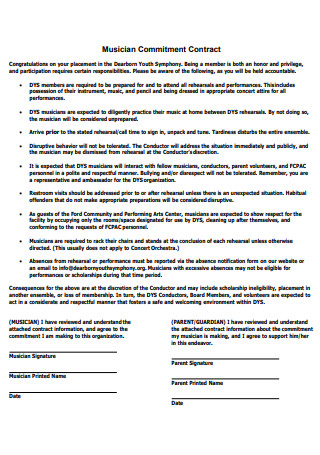
Musician Commitment Contract
download now -
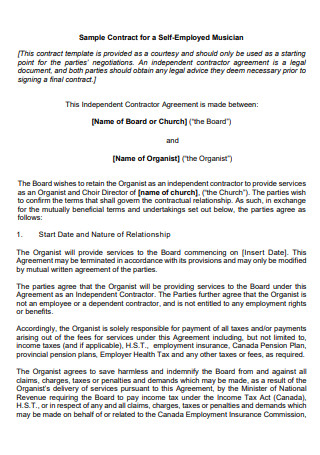
Sample Self-Employed Musician Contract
download now -
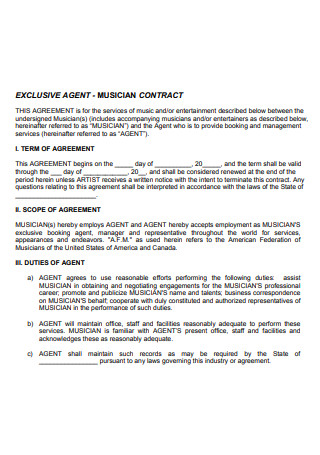
Exclusive Agent Musician Contract
download now -
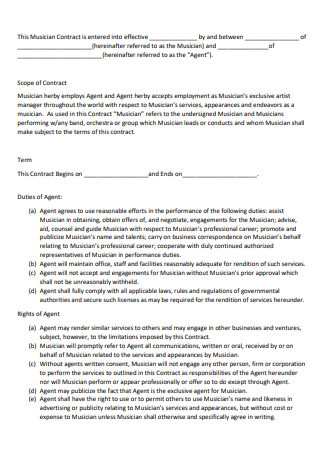
Formal Musician Contract
download now -
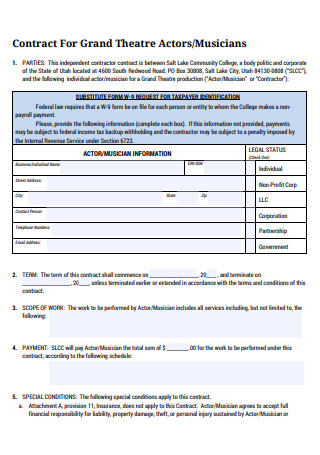
Musician Contract For Theatre Actors
download now -
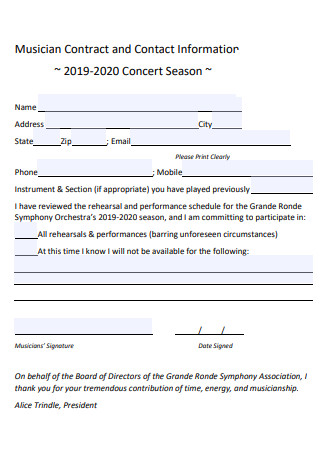
Printable Musician Contract
download now -
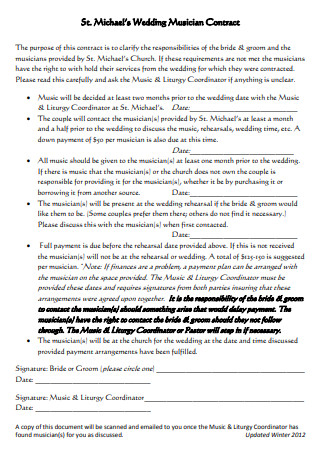
Wedding Musician Contract
download now -
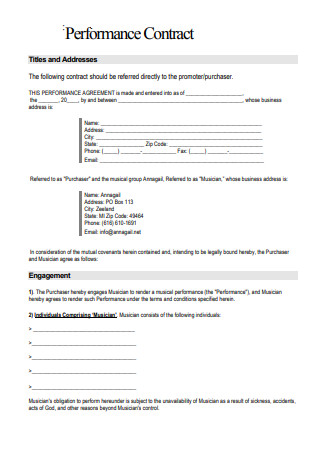
Musician Performance Contract
download now -
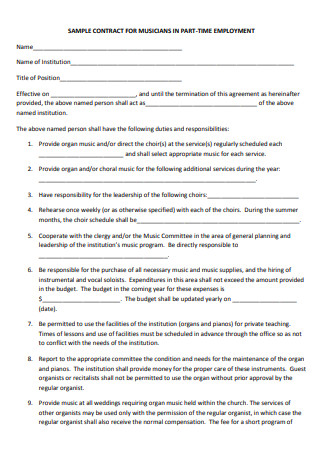
Sample Musician Contract
download now -
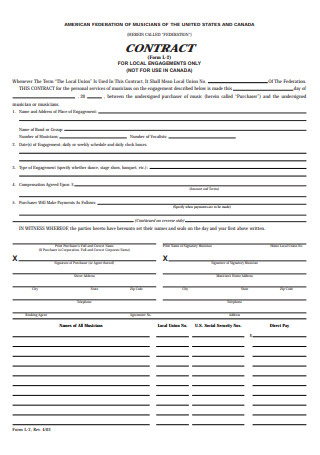
Musician Contract in PDF
download now -
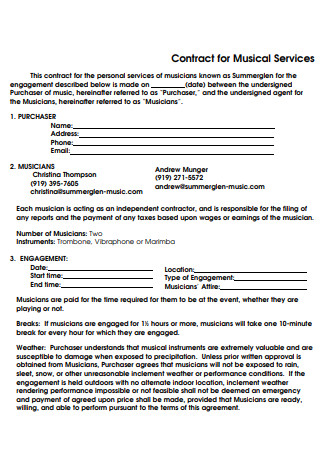
Musicial Services Contract
download now -
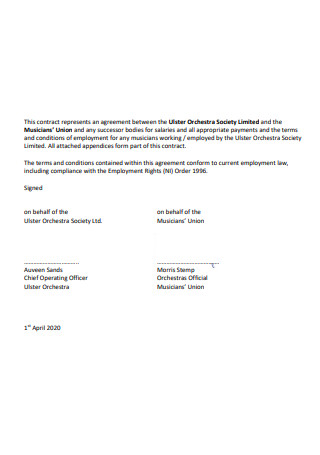
Standard Musician Contract
download now -
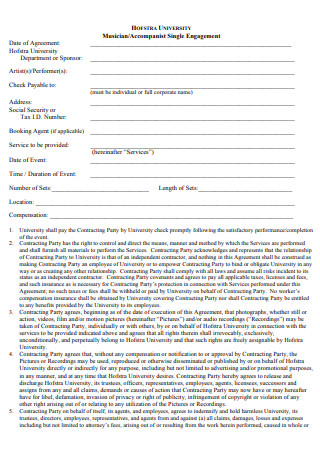
Basic Musician Contract
download now -
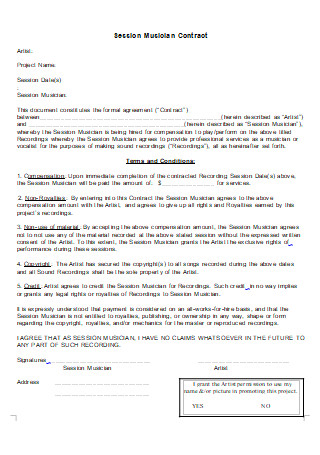
Session Musician Contract
download now -
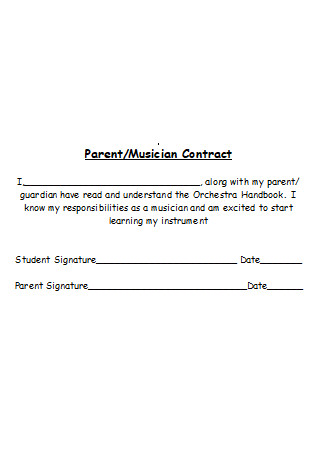
Parent Musician Contract
download now -
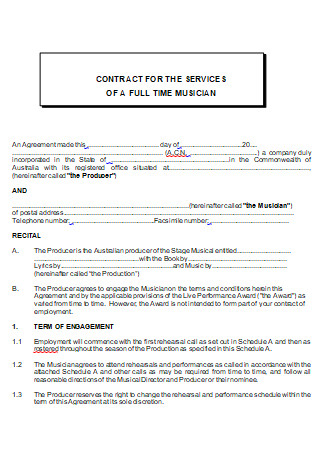
Full Time Musician Contract
download now
FREE Musician Contract s to Download
15+ Sample Musician Contract
What is a Musician Contract?
Different Types of Musician Contracts
Benefits of Writing a Musician Contract
Basic Features of a Musician Contract
How to Create a Musician Contract
FAQs
What are the essential steps of creating a musician contract?
What are the basic features of the musician contract?
What are different types of musician contracts?
What are some common types of musicians?
What is a Musician Contract?
A musician contract is a formal document presenting an agreement being offered to a solo musician or musical band by a music agent or record label. This document is a significant tool in establishing the terms and payment details for the musical record agreement concerning that the musician will perform the duties and responsibilities defined in the written contract.
According to a statistical report, the revenue for the musical artists and groups in the music and entertainment industry is forecast to increase 19.8% in 2021 after a decline of 38.5 % in 2020 due to the impact of the global COVID-19 pandemic. Thus, if you need to start working on a contract for a musician, the first thing you need to accomplish is preparing a standard musician contract.
Different Types of Musician Contracts
Musicians, composers, producers, songwriters, actors, choreographers, directors, performance artists and any creative professionals who provide a particular service should be able to understand a wide spectrum of contracts that they sign and the binding professional relationships they prefer to enter although there are times that they never sign an actual contract. In this section, there are different types of musicians contracts that you can choose from depending on what you will work on. Below are different types of musician contracts:
1. Self-Employed Musician Contract
Are you a self-employed or freelance musician? While you get to do what you want and make a living through your music freely, there are some ups and downs in generating adequate income. Polishing your musical craft is not just the major thing that you need to do but you also need to learn and understand the business of performing which will help you in protecting your legal interests. Developing a simple and structured self-employed contract for your musical performance is an essential method to properly negotiate your entertainment services to the other party.
2. Exclusive Agent Musician Contract
Are you an artist manager of a rising or prominent artist or musical group? Your artist or musical group may need an exclusive agent musician contract. It will assist them in having the right exclusive agent that will manage their bookings and other business affairs. It is typically a five-page document which consists of 19 clauses such as confidentiality, exclusivity of agent’s services, agent’s duties, agent’s compensation, merchandise sales agreement, termination and non-assignment. Writing a clear musician contract for the artist or musical group is advantageous in providing legal protection for them.
3. Wedding Musician Contract
If you are a singer who prefers to sing in special and intimate events such as weddings, you need to write an appealing wedding musician contract. This will help you in terms of handling several legal situations and protecting your rights in performing at several wedding events. Plus, it will help you to clarify some important details to the client.
4. Musician Performance Contract
The Self-Promoting Musician: Strategies for Independent Music Success stated that a musician performance contract is the basic legal tool that establishes an agreement between the band or its legal representatives and the venue operator or promoter when it comes to staging a musical performance in a show. So, it is essential to create a simple and engaging contract which ensures the primary interests of the musicians.
Benefits of Writing a Musician Contract
Whether a creative professional is working as a self-employed, independent, exclusive agent, or part-time musician, it is very important to negotiate contract terms and conditions with a musician in a mindful manner, especially when it comes to legal liability in the musical services for a particular music record label or organization. So, what are the benefits of writing a contract for musicians, music publishing and record label business firms? Below are some of the benefits of writing a musician contract:
1. Clear Mutual Agreement
Mutuality or the evidencing of the mutual assent is the expectation that a deal was freely negotiated, unencumbered by duress and the undue influence, and that a true meeting of the minds happened, resulting in both parties desire to enter into an arrangement proving an intent to be legally bound to each other under a contract. By being aware and understanding why a specific provision has been included and what it fulfills inside the contract, the musician should have a clear mutual agreement when introduced with a certain contract. Also, the musician is well-informed of what is and is not valuable. The musician and the record label may disagree on some areas, but the common agreement is something that both prefer. This is the reason why mutuality is essential in the contracts. This will help in validating a contract and making clear that mutual assent exists as the strong basis for the agreement.
3. Regulate Tax and Legal Matters
If the musician is a band, writing a musician contract is highly important because it is used in regulating tax and legal matters within the band. The significant cornerstones of the musician contract are distribution of income, band name rights, distribution of jobs, withdrawal of band members, fatality, insurance, and many other aspects.
4. Administers Artist’s Fees and Profit Sharing
Constructing a musician contract appears to be beneficial in administering the fees and profit sharing, especially if you hire external musicians and singers for a particular music project. A musician contract authorizing the ‘transfer of rights’ is helpful in granting the related rights to the guest musician or singer. Plus, it makes sure that a record label can have permission to use and reproduce performances accordingly.
5. Emphasize Record Label Exclusivity
When you write a musician contract, it emphasizes the record label exclusivity to the musician. It prohibits the musician from going into another contract with a competitor record label. This will allow musicians to guarantee that they have no existing contracts with the competitor music agencies. So, a musician contract is tangible evidence that the musician should uphold his or her loyalty entirely to a specific music agency or entertainment record label during the term of his or her musical career based on the contract.
Basic Features of a Musician Contract
In this section, you will learn how to construct a remarkably written and simple musician contract. However, a musician contract has different features. Include the following elements for you to create an simple yet structured formal written contract:
How to Create a Musician Contract
While creating a musician contract, it is important for both musicians and record labels to work with dignified musicians and other famous record labels, as well as considering the potential live music revenue, live music ticket sales revenue, and other notable aspects. For example, the global sales revenue of SM Entertainment, one of the leading South Korean entertainment company that manages TVXQ, Super Junior, Girls’ Generation, SHINee, EXO, Red Velvet, NCT, and aespa, amounted to around ?580 billion ($503 million) in 2020. In this matter, we suggest that you follow the simple steps below while freely using one of our sample musician contracts in this article:
Step 1: Indicate the Major Details of the Agreement
The first step is to indicate the major details of the agreement created by the musician and entertainment record label. Include the names of the musician and the key people in the music and entertainment company such as the executives, and managers. Also, it is important to avoid typographical errors, particularly in the spelling of the personal information of both parties. So, verify the details in the musician contract to prevent you from having abrupt problems like legal contract issues.
Step 2: Explain the Scope of the Musician’s Career Management or Performance
One of the fundamental parts of the musician contract is the scope of the musician’s career management or performance. So, explain thoroughly the overall scope of the musical career management such as the record deals, publishing deals, concert promotions, bookings, and other aspects that will help in fully setting up a stable career for the musician.
Step 3: Write the Specific Dates of Agreement and Artist Fee
The third step is you should write the specific dates in the musician contract together with other significant dates to consider. For instance, the start and end dates of responsibilities for a specific musician’s musical career management. Add the artist fee based on the success of the musician in the entertainment scene.
Step 4: Provide the Necessary Clauses and Provisions
The Enterprising Musician’s Guide to Performer Contracts explained that determining the necessary clauses in a musician contract and understanding how they operate in the context of the contract is critically significant as these clauses, taken as a whole, will extend or contract the rights of the musician. One example of the clauses is the agency clause when the artist engages the manager in providing services as the representative, personal manager and consultant of the artist to direct the career of the artist as a vocalist. On the other hand, provisions are sometimes applied interchangeably with clauses that hold the idea or concept of a particular thing. For instance, the restriction against making changes to the contract is an Amendment Provision which is indicated in the Amendment Clause.
Step 5: Showcase Clarity and Conciseness
When it comes to creating contracts for musicians, entertainment business and other legal issues, you should showcase clarity, and conciseness through the proper usage of words, terms, and phrases in the document. Avoid the use of vague words such as unnecessarily long or highly stylized words. Take note that unclear language can be fatal to the person who drafts the contract as it goes against a basic tenet of legal writing called contra proferentem which means “against the offeror/drafter.” Instead, use words that can be easily understood by the readers and properly define the terms in a contract.
Step 6: Prepare the Final Draft
Last but not the least, prepare the final draft of your musician contract. We recommend that you attach any supporting documents if necessary. Schedule a meeting with the potential, rising, or famous musician, the artist management agency, and the executives and managers of the record label that will be involved in facilitating the career of the musician as stated in the musician contract. Also, you may get some help from editors and proofreaders or use some editing and revising tools for much needed proofreading and revision of your document.
FAQs
The essential steps of creating a musician contract are being trustworthy and clear from the start of the agreement, and providing the necessary details of the musician contract such as the complete name and contact information of the recording company, major information about the artist such as the group name, individual artist names and contact details, production details such as the studio address, and recording session dates, exclusive agreement clause, recording and promotional fees, royalties, promotional appearances, and termination provisions.
What are the essential steps of creating a musician contract?
The basic features of the musician contract are the complete names of the musician and the key individuals of the music and entertainment record label, timelines and milestones, musician and record label guidelines, musical record deliverables, brand exclusivity, and many others. Explain the inclusions and other terms and conditions as well.
What are the basic features of the musician contract?
The different types of musician contracts are self-employed musician contract, freelance musician contract, exclusive agent musician contract, musician contract for theatre actors, wedding musician contract, musician performance contract, musical services contract, and full time musician contract.
What are different types of musician contracts?
Some common types of musicians are independent musicians, signed musicians, independent label musicians, major label musicians, songwriters, composers, session musicians, producer-composer, orchestral musicians, music teachers, legacy musicians, and entrepreneurial musicians.
What are some common types of musicians?
A report stated that independent musicians releasing music made up 6.3% of all Spotify streams in 2020, showing a dramatic rise of 28% from 2019. All kinds of musicians should construct clear and effective musician contracts to help them in setting up mutual agreement, regulating tax and legal matters, managing artist fees and profit sharing, and emphasizing record label exclusivity. If you are a musician or an artist manager, it is very crucial to learn about the basics of writing a musician contract. Before achieving the success of a musical career, please follow the aforementioned tips and steps here so that you are able to craft a simple musician contract. Plus, download our musician contract samples here today!
